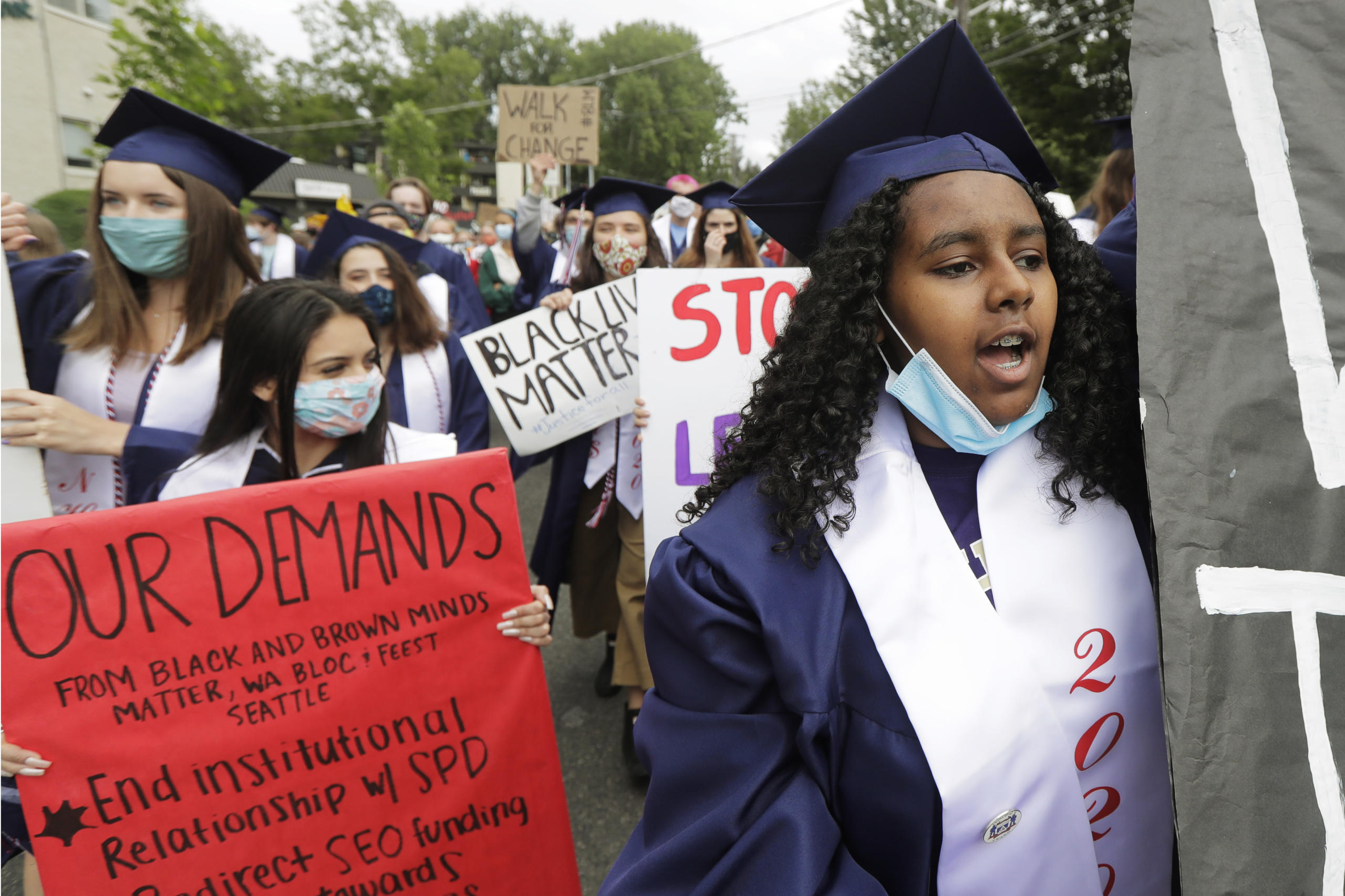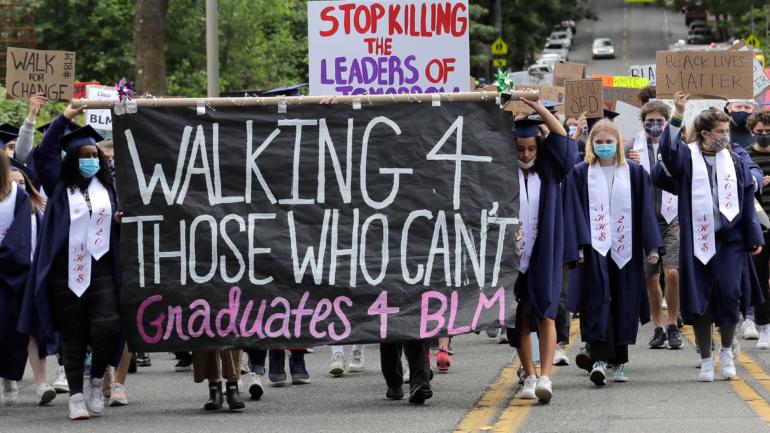Three weeks after the death of George Floyd, an unarmed black man extra-judicially slain by a white Minneapolis police officer, protests continue to engulf the United States and the world. In response, police across the country have viciously attacked peaceful, violent, black and white protesters alike – even continuing to kill unarmed black men, as recently happened in Atlanta, as a reminder of their total lack of remorse. A majority of the public has taken notice on the issue and recent calls to “Defund the police” have significantly shifted the so-called Overton window in the U.S. on the issue of policing.
Editor’s note: Bradley Blankenship is a Prague-based American journalist, political analyst and freelance reporter. The article reflects the author’s opinions, and not necessarily the views of CGTN.
The Black Lives Matter (BLM) movement started in 2013 as a social media movement after George Zimmerman’s acquittal in the shooting death of Trayvon Martin, an unarmed black teenager, in 2012. BLM later gained a national spotlight in 2014 after the death of Michael Brown, an unarmed young black man, by a white police officer caused unrest in Ferguson, Missouri. Demands for justice over the death of Eric Garner in New York City, an unarmed black man who was killed in a chokehold by a police officer that same year, were also championed by BLM who popularized the now-famous phrase “I can’t breathe.”
BLM was initially a polarizing movement in the U.S. that spawned a reactionary “All Lives Matter” retort from many on the political right. Now, BLM is supported by two-thirds of American adults, according to a recent Pew Research Center poll. While minorities overwhelmingly support the movement, 60 percent of whites now support it which is very significant and speaks to not only the effectiveness of the nearly seven years of organizing by BLM, but also the self-evident egregiousness of police brutality now on daily display in response to protests.
With this newly established popularity, what have progressive activists in the BLM movement and beyond put forward as demands? Very simply: defund the police (if not totally disband them). The simple slogan of “Defund the police,” which appears to mean different things to different people though is a quite straightforward policy suggestion, is ingenious for its simplicity as well as its well-timed insurgency.
“Enough. We can’t reform the police. The only way to diminish police violence is to reduce contact between the public and the police,” wrote Mariame Kaba in a column for the New York Times. “There is not a single era in the United States history in which the police were not a force of violence against black people.”
“The only way we’re going to stop these endless cycles of police violence is by creating alternatives to policing. Because even in a pandemic where black people have been disproportionately killed by the coronavirus, the police are still murdering us,” wrote Philip V. McHarris and Thenjiwe McHarris also for the New York Times.

Graduates of Nathan Hale High School and other schools wear caps and gowns as they take part in a Black Lives Matter March, march, Monday, June 15, 2020, in Seattle. The theme of the march as “Walking For Those Who Can’t,” and organizers were calling for police funding reforms and an end to Seattle public schools’ relationship with the Seattle Police Dept. (AP Photo/Ted S. Warren)
It may sound extreme, and members of the Democratic Party establishment have declared it as such. However, when compared to other analogous demands in the past, namely the push to “Abolish ICE” (U.S. Immigration and Customs Enforcement) during the 2018 midterm elections, there is significantly greater potential.
When looking at the polls, it may not seem immediately obvious. “Abolish ICE” didn’t land with a majority of Americans, with only one in four supporting the move in 2018 – though a significant number of Democrats supported it – and recent polls may suggest the same for “Defund the police.” A recent ABC News/Ipsos poll found that a slightly larger share of Americans support defunding the police – 34 percent – with a majority of Democrats and less than 10 percent of Republicans.
However, with such a large swath of the public now so “radical” on this issue, this has translated to the general opinion on the status quo of policing in America shifting. A majority of Americans support the protests and don’t agree with U.S. President Donald Trump’s handling of them. What’s more, a recent Reuters/Ipsos poll found that, for example, 82 percent of Americans want to ban the use of chokeholds by police, 83 percent want to ban racial profiling and 92 percent are in favor of mandatory body cameras for police. Even 91 percent support independent investigations into alleged police misconduct.
Whether out of principle or polling, the tough-on-crime Republican Party and many of its biggest figures have taken notice. For example, former Republican presidential nominee and Senator from Utah, Mitt Romney, took to the streets to rally for BLM in Washington, D.C. alongside mostly left-wing activists. Other hardline Republicans including Ted Cruz, Mitch McConnell and others have labeled the killing of George Floyd a clear case of police brutality, paving the way for the conversation to shift to a possible solution.
The solution agreed on now by even the Republican Party is to reform the police, which is a position no one could have imagined given their Olympics-tier mental gymnastics when justifying police brutality, historically speaking. This new position has largely been staked out as a more moderate position in relation to “Defund the police”, which highlights the success of the latter.
Even though it is unlikely that the entire country will disband its police forces similar to what happened in Camden, New Jersey and what is taking place now in Minneapolis after a city council vote to replace the police with a community-led model, some form of change will more than likely happen at the federal level and probably in a significant way.
While not yet a total victory, BLM has gained the trust of the American people to advance the cause of social justice at a higher level than both major political parties and spawned an international movement to promote anti-racism. This meteoric rise highlights the success of unrelenting protest and tough demands in achieving social progress.
 CGTN America
CGTN America Graduates of Nathan Hale High School and other schools wear caps and gowns as they take part in a Black Lives Matter March, march, Monday, June 15, 2020, in Seattle. The theme of the march as “Walking For Those Who Can’t,” and organizers were calling for police funding reforms and an end to Seattle public schools’ relationship with the Seattle Police Dept. (AP Photo/Ted S. Warren)
Graduates of Nathan Hale High School and other schools wear caps and gowns as they take part in a Black Lives Matter March, march, Monday, June 15, 2020, in Seattle. The theme of the march as “Walking For Those Who Can’t,” and organizers were calling for police funding reforms and an end to Seattle public schools’ relationship with the Seattle Police Dept. (AP Photo/Ted S. Warren)
